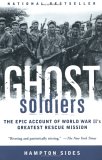Summary | Excerpt | Reviews | Readalikes | Genres & Themes | Author Bio

Critics' Opinion:
Readers' Opinion:
First Published:
May 2001, 336 pages
Paperback:
May 2002, 384 pages
When he looked around, Nielsen realized that a surprising number of Americans had made it down to the beach--perhaps twenty or thirty. Some, like Nielsen, had torn bare-handed through the barbed wire, but the largest group had made it down by virtue of a subterranean accident: a natural escape hatch that led from one of the trenches out to a shallow ledge in the eroded cliff wall. Several weeks earlier, while digging the air-raid pits, some of the Americans had serendipitously discovered this small fissure, and they'd had the forethought to conceal it by plugging the opening with sandbags and a veneer of dirt so the Japanese would never see it. They had thought, in a not very specific way, that this tunnel might come in handy someday, and they were right. One by one, they escaped the incinerating heat of their shelter by crawling through the hole and burrowing out to the rock landing. From there they jumped down to the beach, where they hid among the various crevices and rock outcroppings.
By doing so they gained only a temporary reprieve, however, trading one form of butchery for another. Eugene Nielsen, still lying in the refuse heap, heard gunfire sputtering up and down the beach. Systematically, the soldiers were searching the rocks and hunting down fugitives. It was obvious that they intended to exterminate every last one. The prisoners camouflaged themselves with slathered mud and cringed in the rocky clefts and folds, lacerating their legs and feet on the coarse coral as they tried to squeeze into ever tighter recesses. Other prisoners took refuge in a sewage pipe that was half filled with stagnant water, while still others concealed themselves in thick mattresses of jungle weeds higher along the banks.
The seaside massacre went on for three or four hours. The Japanese would pluck the prisoners from their hiding places and slay them on the spot, either by gunshot or by bayonet. Squads of soldiers combed the weeds in tight formation, plunging their bayonets every foot or so until they harpooned their quarry. One American who'd been caught was tortured at some length by six soldiers, one of whom carried a container of gasoline. Seeing the jerry can, the American understood his fate and begged to be shot. The soldiers doused one of his feet with gasoline and set it alight, then did the same with the other. When he collapsed, they poured the rest of the gasoline over his body and ignited it, leaving him writhing in flames on the beach.
Not far away, a prisoner from South Dakota named Erving Evans, realizing he'd been seen and hoping to avoid the same fate, leaped up from a trash pile where he'd been hiding and blurted, "All right, you bastards; here I am, and don't miss."
They didn't.
They were bayoneting guys down low and making them suffer. They shot or stabbed twelve Americans and then dug a shallow grave in the sand and threw them in. Some of these men were still groaning while they were covered with sand. Then the Japs started to cover the grave with rubbish from the pile where I was hiding. They scraped some of the coconut husks off, and found me lying there. Then they uncovered me from the shoulders on down. They thought I was dead, and seemed to think I had been buried by my friends. I lay there for about fifteen minutes while they stood around talking Japanese. It was getting to be late in the afternoon. One of the guys hollered it was time to eat dinner, and every one of the Japs there went off somewhere to eat. I got up and ran down along the beach and hid in a little pocket in a coral reef there.
Down among the coral, Nielsen encountered seven other survivors. One of them was very badly burned. His hair was singed and "his hide was rubbing off when he brushed against anything." They were all crouched among the rocks, hiding from a barge that was methodically trolling the coves and foreshores. Having exhausted their hunt by land, the Japanese were now searching by water. Aboard the barge were three or four soldiers armed with rifles as well as a tripod machine gun.
Excerpted from Ghost Soldiers by Hampton Sides Copyright 2001 by Hampton Sides. Excerpted by permission of Doubleday, a division of Random House, Inc. All rights reserved. No part of this excerpt may be reproduced or reprinted without permission in writing from the publisher.





The Flower Sisters
by Michelle Collins Anderson
From the new Fannie Flagg of the Ozarks, a richly-woven story of family, forgiveness, and reinvention.

The House on Biscayne Bay
by Chanel Cleeton
As death stalks a gothic mansion in Miami, the lives of two women intertwine as the past and present collide.

The Funeral Cryer by Wenyan Lu
Debut novelist Wenyan Lu brings us this witty yet profound story about one woman's midlife reawakening in contemporary rural China.
Your guide toexceptional books
BookBrowse seeks out and recommends the best in contemporary fiction and nonfiction—books that not only engage and entertain but also deepen our understanding of ourselves and the world around us.